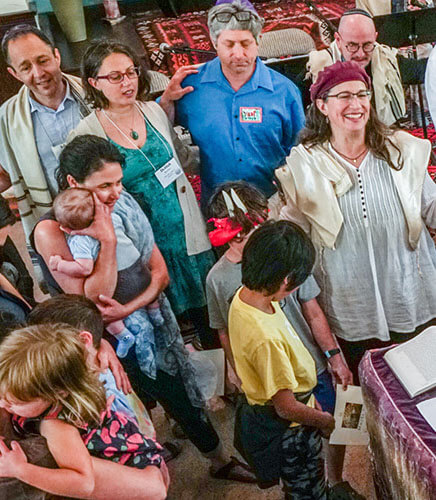Sarah’s Trauma and Our Own
Teaching for Rosh Hashanah Torah Reading 2023/5784
Zvika Krieger, Chochmat HaLev
The Torah portion that we read on Rosh Hashanah begins with the story of Sarah, our foremother. Sarah had been promised a child by the Divine, but for 30 years was barren. In the meantime, her husband Avraham conceives a child with his other partner Hagar. Eventually Sarah conceives a son, Yitzchak, and the two boys are raised together.
But then something strange happens. Sarah sees the two boys playing together and she says to Avraham, “גָּרֵ֛שׁ הָאָמָ֥ה הַזֹּ֖את וְאֶת־בְּנָ֑הּ – Expel that slavewoman and her son, for that son of a slave woman will not share an inheritance with my son.” Seems a little harsh. Even if it was really difficult for her to be barren for all those years, this seems like quite an over-reaction – kicking them out of the house just because the boys were playing together?
The rabbis try to offer all sorts of explanations – perhaps Yishmael was making fun of Yitzchak, or he was being a bad influence on him. But none of them seem to really be in line with the text.
וַתֵּ֨רֶא שָׂרָ֜ה אֶֽת־בֶּן־הָגָ֧ר הַמִּצְרִ֛ית אֲשֶׁר־יָלְדָ֥ה לְאַבְרָהָ֖ם מְצַחֵֽק׃
“Sarah saw the son whom Hagar the Egyptian had borne to Abraham playing.”
I think the key to understanding Sarah’s reaction might be in the phrase “Hagar the Egyptian.” Why does she specify that Hagar is Egyptian? What significance to Egypt have to Sarah?
My teacher, Reb Marcia Prager, likes to say the Torah is full of hyperlinks. And if we were to click this hyperlink, it will take us to some challenging places – so if you struggle with stories about assault, I invite you to take care of yourself here.
If we click that “Egypt” hyperlink, it would take us to earlier in Sarah’s life, shortly after she marries Avraham. They encounter a famine in the land of Canan and travel to Egypt in search of food. Avraham is worried that, because of her beauty, the Egyptians will kill him and abduct her. So he tells the Egyptians that Sarah is his sister. While that does spare his life, Pharaoh himself ends up taking her captive.
This is the first story we hear of Sarah in the Torah, and it’s fair to assume it had a significant impact on her, a young newlywed, violated.
And so we return to our Torah portion, where Sarah now has an Egyptian boy growing into an Egyptian man in her own house, and her trauma response is triggered. “Garesh otam” – get them out of here. It gives you a little more sympathy for Sarah in this situation.
So as we read this ancestral story with new eyes, I invite each of us to consider where in our lives we may have acted from a place of trauma. Where we may have “over-reacted” because we were not reacting only to the person in front of us, but someone earlier in our lives who hurt us deeply. Like our compassion for Sarah, let’s have compassion for that part of ourselves.
In this new Jewish year of 5784, let us call in patience and healing for those wounded parts of ourselves. Let us call in healing for those in our lives who struggle with trauma, and patience for ourselves as we navigate those relationships.
And there is another half to this story. Avraham readily obliges when Sarah asks him to kick out Hagar and Yishmael. While we can certainly criticize his callousness toward them, this does seem like an attempt at repair with Sarah. In Egypt, Avraham imperiled Sarah to save himself. In this Torah portion, he’s putting her first.
May we all be blessed with reparative experiences and with supportive partners and friends who can support us in healing our painful past. May we all be blessed with the wisdom to see the hurt that may be underlying our own actions and the behavior of others, and to greet that awareness with patience and compassion. And may we all be blessed this year with an ever-deepening sense of safety, wholeness, and love.
